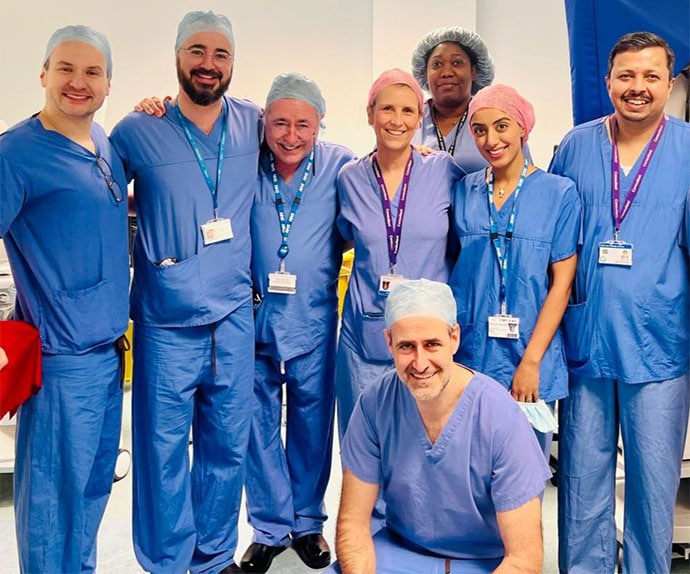The UK's first living donor uterus transplant, between two sisters, has been successfully carried out by a team co-led by surgeons at Imperial College Healthcare NHS Trust and Oxford University Hospitals NHS Foundation Trust.

Both donor and recipient were reportedly doing well 10 weeks post-operatively.
Procedure Can Now Transition From Research to Clinical Practice
According to the case report published in the BJOG , the British operation follows more than 90 previous uterine transplant cases in the literature, with the achievement of 49 live births. The surgical team said: "There is no question regarding the feasibility of the procedure as it now transitions from research concept to clinical practice."
The transplant recipient was a 34-year-old woman with a rare congenital disorder characterised by an underdeveloped vagina and uterus . The donor was her 40-year-old sister, who had completed her family after two normal term vaginal deliveries following uncomplicated pregnancies.
The case report detailed the surgical procedure in depth. Donor retrieval took 8 hours 12 minutes and involved a modified radical hysterectomy with bilateral salpingectomy but preservation of both ovaries. The donor was discharged on postoperative day 5, and had an uneventful recovery.
Recipient surgery, which involved transplantation of the uterus, cervix, surrounding ligamentous tissues, associated blood vessels, and a vaginal cuff, was commenced one hour before the anticipated uterine explant. Implantation operative time was 9 hours 20 minutes – longer than anticipated and complicated by higher than expected blood loss, although this was mitigated by proactive cell-salvage homologous transfusion.
Eighteen Hour Operation Undertaken by Volunteer Team
The two overlapping procedures took almost 18 hours altogether, and the whole surgical and anaesthetic team volunteered to take part in the operations in their own time .
In addition to immunosuppression, the recipient received 5 days' antimicrobial and antifungal prophylaxis; 6 weeks' thromboprophylaxis, to be maintained by low dose aspirin while the graft remains in situ, and 6 months' prophylaxis against CMV and pneumocystis pneumonia.
The recipient was discharged on day 10 postoperatively after a minor problem with
excessive lymph output, which resolved with conservative management. She had her first period 2 weeks postoperatively and her third by 10 weeks postoperatively, with ultrasonographic evidence of cyclical endometrial proliferation, and remained well at the time of the report with "no evidence of rejection so far".
Pregnancy Hoped for Later This Year
All being well, later this year she will undergo embryo transfer of previously cryopreserved blastocysts generated by earlier in vitro fertilisation.
The team said that uterine transplantation was "the only intervention that restores reproductive anatomy and functionality in women with absolute uterine factor infertility". In addition, it offered these women "an alternative to adoption and surrogacy as a route to motherhood", with "the unique prospect to gestate and give birth to genetically related offspring, enabling them to acquire biological, social, and legal parenthood, thereby circumventing many of the challenges associated with adoption and surrogacy".
However, the surgical team admitted that uterine transplant was associated with "significant risk", which included multiple major surgeries, immunosuppression while the graft was in situ, and the necessity for in vitro fertilisation to achieve pregnancy.
The operation and previous research were funded by the charity Womb Transplant UK, whose founder and chair Professor Richard Smith, consultant gynaecological surgeon at Imperial, was co-lead of the surgical team. Prof Smith said: "This is a first for the UK, following over 25 years of research, and is only possible thanks to the recipient's sister who came forward and was willing to donate. It is still very early days but, if all continues to go well, we hope the recipient will continue to progress, and be in a position to have a baby in the coming years."
Operations "Went According to Plan"
His surgical co-lead, Miss Isabel Quiroga, consultant transplant and endocrine surgeon at the Churchill Hospital in Oxford, who is clinical lead for organ retrieval at the Oxford Transplant Centre, said: "It was a privilege to carry out the UK's first womb transplant. The operations, while long and complex, went according to plan, and I am delighted to see that the donor and recipient are recovering well.
"I look forward to the time when this procedure becomes more common and more women have the opportunity to have their own baby."
Commenting to the Science Media Centre, Ying Cheong, professor of reproductive medicine and honorary consultant in reproductive medicine and surgery at the University of Southampton, said: "Uterine transplantation is a great surgical transplant advancement, although the patient journey for transplantation and also the surgical journey is still filled with challenges."
Dr Meenakshi Choudhary, consultant in reproductive medicine and gynaecology at Newcastle upon Tyne Hospitals NHS Foundation Trust, described the transplant as a "medical milestone" that offered hope "not only to young girls born without a womb but also to a broader range of individuals facing reproductive challenges following removal of uterus for various indications, such as cancer."
For more news, follow Medscape on Facebook, Twitter, Instagram, and YouTube


Comments